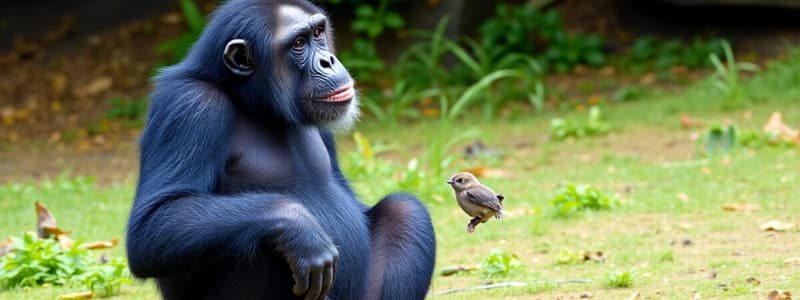Podcast
Questions and Answers
What percentage of DNA do humans and chimpanzees share?
What percentage of DNA do humans and chimpanzees share?
- 99.5%
- 95.7%
- 98.8% (correct)
- 97.2%
What method did researchers use to study the behavior of the chimpanzee groups?
What method did researchers use to study the behavior of the chimpanzee groups?
- GPS trackers (correct)
- Direct observation
- Drones
- Camera traps
Why did chimpanzees patrol higher ground along their territory borders?
Why did chimpanzees patrol higher ground along their territory borders?
- To find food sources more easily
- To assess the risk of conflict with rivals (correct)
- To hunt predators more effectively
- To establish dominance over other groups
Which behavior is NOT associated with the military tactics of chimpanzees, as described in the study?
Which behavior is NOT associated with the military tactics of chimpanzees, as described in the study?
What conclusion did researchers draw about the cognitive abilities of chimpanzees?
What conclusion did researchers draw about the cognitive abilities of chimpanzees?
Flashcards
Chimpanzee Military Tactics
Chimpanzee Military Tactics
Chimpanzees strategically utilize elevation to assess the potential risks of conflict with neighboring groups.
Chimpanzee Patrol Behavior
Chimpanzee Patrol Behavior
Chimps regularly patrol their territory's edges with small groups and move in a coordinated manner, seeking out higher ground to observe potential threats from rival groups.
Chimpanzee Cognitive Abilities
Chimpanzee Cognitive Abilities
Chimpanzees, like humans, use complex cognitive abilities to evaluate risks and adjust their behavior based on the presence of rivals.
Fluid Territorial Boundaries
Fluid Territorial Boundaries
Signup and view all the flashcards
Chimpanzee Tactical Warfare
Chimpanzee Tactical Warfare
Signup and view all the flashcards
Study Notes
Chimpanzee Territorial Behavior
- Chimpanzees and humans share a high degree of genetic similarity (98.8%), leading to observable behavioral parallels, including communication (gestures, vocalizations) and tool use.
- New research suggests chimpanzees employ sophisticated military-like tactics to evaluate risk and expand their territories.
- Researchers from the University of Cambridge, led by Dr. Sylvain Lemoine, studied two western chimpanzee groups in Tai National Park, West Africa.
- GPS trackers monitored the chimps' movements for 8 to 12 hours daily from 2013–2016.
- Chimpanzee groups regularly patrolled the territory boundaries, mimicking human military tactics.
- They travelled in small, coordinated groups, often taking position on elevated areas along the borders.
- From elevated positions, they listened for rival groups.
- The chimpanzee groups' daily presence rather than a fixed boundary defines territory.
- When rival groups were few (low risk of confrontation), chimpanzees boldly ventured into neighboring territories.
- Chimpanzees strategize through risk assessment using elevated vantage points to assess potential threats accurately.
- This is the first time an animal (other than humans) has been observed using high ground strategically to evaluate potential conflict.
- Complex cognitive abilities are crucial for their territorial behavior: a key factor in chimpanzee evolution, similar to human military strategies.
- Findings were published in PLOS Biology on November 2, 2023, suggesting similar strategies may apply to other chimpanzee populations.
Studying That Suits You
Use AI to generate personalized quizzes and flashcards to suit your learning preferences.





